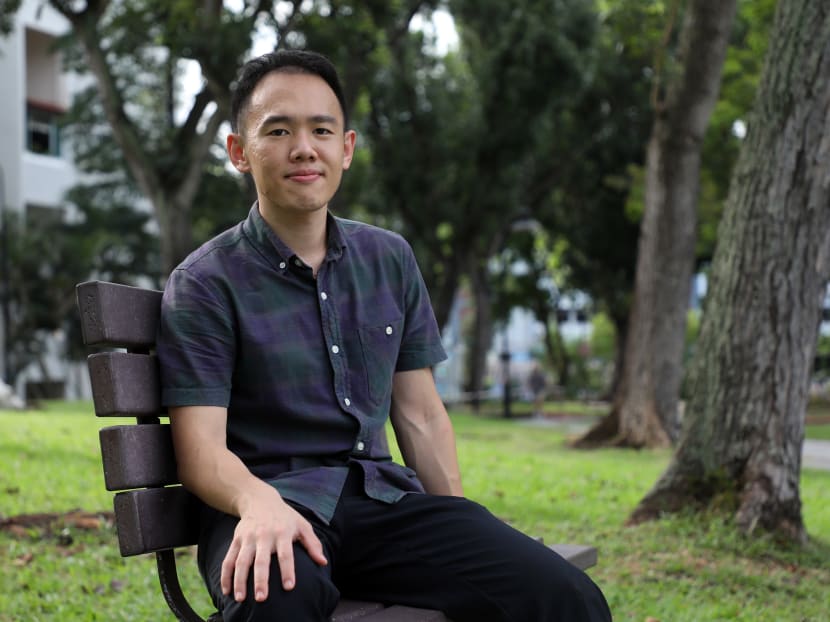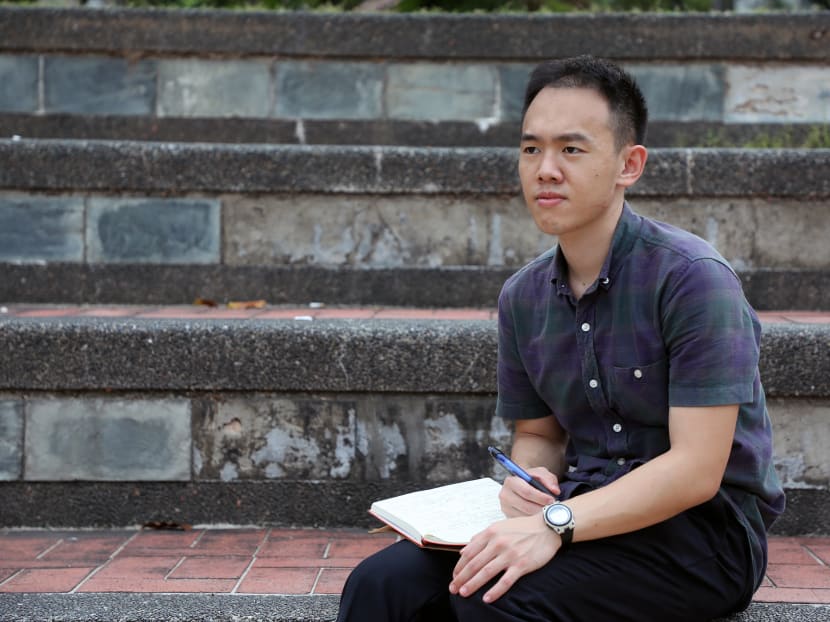Gen Y Speaks: I suffered depression twice in 4 years. This is how I cope
March 2014 — the day of the A-Levels result release. The mood in the school hall was tense.

The author's A-Level results did not qualify him for medical school and led him to contemplate suicide.
March 2014 — the day of the A-Levels result release. The mood in the school hall was tense.
My teacher handed me my results without saying a word.
I looked down and saw my grades: BBAD (or bad). It seemed like a bad joke.
In an instant, all my dreams of becoming a doctor were crushed.
The two years in National Service (NS) gave me time to think. Yet my resolution to study medicine in Singapore became greater as I heard friends talk about their own journey through medical school.
But there seemed to be no way… or was there?
I heard of the Discretionary Admissions scheme that allows students with outstanding achievements in sports, community work, or other areas get into a course.
So I focused on entering medicine through this scheme by volunteering to organise large scale charity events, such as a family day for 320 caregivers, beneficiaries and volunteers.
But I soon learned that my chances of securing entry into medical school in Singapore were extremely slim as grades would still be a consideration via the discretionary scheme.
Besides, I didn’t have outstanding non-academic achievements to speak of.
The grief of losing my dream led me to start questioning my purpose in life.
“What’s the point of fighting any more? No one values me anyway,” I thought to myself as I contemplated suicide.
One night in December 2015 , I called a crisis hotline. The counsellor convinced me to see a doctor.
The doctor promptly sent me to the Institute of Mental Health for an assessment. I was scared.
Someone called my parents. That night, my dad wrapped his arm around my shoulder and said: “John, whether you have five As or no As, you’re still my son.”
After an assessment by a psychiatrist, I was allowed to go home with my parents.
But I had to go back for a follow-up in two months.
Things didn’t get better from there.
I was getting closer to the day when I finished NS. But I still didn’t know what I was going to do with my life.
I turned to food to snuff out the anxiety within me. I would finish an entire bar of chocolate, a tray of cookies and a box of cake in a day.
Within a month, I put on 8kg.
Then the day came when I collected my pink identity card. My campmates were in a celebratory mood.
But for me, I was moving out of the safe cocoon of NS into the real world where I had to figure out how to be of value.
Not knowing what to apply for in university, I applied for everything. There was no method to my madness.
From accountancy to engineering to biology to social sciences, I sprayed my applications. I applied for scholarships on a hope and a prayer.
I didn’t know what I liked. I didn’t believe I was good at anything.
So I went with everything and in April 2016, I managed to secure a scholarship to study social work in England.
At that point, I was still new to social work. All I knew was that I enjoyed volunteering to help people with intellectual disabilities, and this role allowed me to help.
WHAT HELPED?
Whenever I look back at the first three months of 2016, there were helpful moments.
I saw neighbours who bothered to give advice. Friends who took time to listen.
A pastor who took time to sit with me, and go through the courses I shortlisted, and ask what I would be most inclined to take up. Family members who took time to sit and listen to me talk about the same issues.
There were actions that helped. Exercising regularly. Journalling daily. Starting part time work as a waiter in March 2016. Then as a tutor in April.
These roles gave me confidence to see that I could still contribute to the world.

But the most helpful thing was seeking professional help in April 2016. I saw a therapist who journeyed with me.
His first exercise was to encourage me to celebrate myself again, writing a letter of love to myself.
It was in first loving myself that I began to find breakthrough.
Having only recovered from my mental distress, I went to England in September 2016, worried that I would have a relapse again.
I thought having no family around me would push me over the edge. Fortunately, it didn’t. Great friends helped. Seeing a counsellor helped.
Most importantly, forgoing the need to always be the best helped me to thrive at university.
THEN IT CAME BACK AGAIN
When you go through something like depression, you never want to go through it again.
Imagine having a dark cloud over you all the time. You don’t look forward to the latest movie. Or the weekend.
You’re just in a state where everything is dull. You want to laugh, but you can’t.
I graduated at the pinnacle of my student career. I won awards, got a first-class degree and was well-liked by classmates.
Yet I touched down in Singapore on Sept 1, 2019 with no concrete job offer.
And this time, I had no idea how to rebuild my life in Singapore.
In the span of a 14-hour flight, I lost everything I knew. A peace I never knew. People I called family. A place I called home.
Finding a suitable job was difficult and stressful.
Because this time, I wasn’t paying for the privilege of being there, like paying for university. I was asking to be paid. I was asking for a livelihood.
It didn’t help that life back in Singapore felt completely empty. It felt awkward to be back with my family and friends.
Sometimes it felt like they had moved on with life, whilst I was stuck in a time capsule. Rapport didn’t seem to come so readily.
I turned back to food. Again.
This time, I didn’t know how to stop. I thought it was just the job hunt that drove me to food.
But when I found a job, and yet couldn’t stop stuffing myself with biscuits from the pantry, I discovered that this was more than that.
It was grief from leaving England.
Sometimes the grief felt so physical that it seemed like someone had stabbed my heart and left it out to bleed.
My therapist urged me to see a psychiatrist. When the psychiatrist recommended that I take antidepressants, I told him I would try managing without them for now.
I thought I could manage on my own. After all, this was just sadness, wasn’t it? If I worked hard enough, I could make it go away.
But it didn’t. I continued stuffing myself with more and more food.
Later, my therapist convinced me to start antidepressants.
I felt tired more easily, and for a while, I didn’t feel happier. But I stopped binging on food.
One day in January 2020, at the Toastmasters’ Club I was part of, someone shared a funny story about how he had tried to get a date.
I laughed until I was all red. I hadn’t experienced laughter like that for five years.
Since the day I got back my A-Level results, things had seemed to have a dull sheen.
From that day in January 2020, I stopped taking antidepressants. Things had gotten better.
When I look back, the day I took antidepressants was the day I gave up control of my situation.
I let go of needing to control every aspect of my recovery, and handed it over to professionals who knew better.
As ironic as this sounds, it was only when I stopped trying to control the outcome, that I got the recovery I desired.
I stopped trying to do things on my own strength. I allowed myself to become better by submitting to the treatment prescribed.
Today, I’m healthier and happier. But I don’t think I would be here today without experiencing depression.
As a corporate speaker today, I desire to build workplaces where young people can flourish, fulfilling their fullest potential.
I hope my journey inspires young people to bravely share the difficulties they face within their workplaces with colleagues and supervisors who can help them.
If you’re going through a dark period today, reach out. Get professional help. You don’t have to go through this alone.
But more importantly, reach in. See, and love the good that exists in you.
Find, and hold onto the hope that whatever happens, you will get better.
ABOUT THE AUTHOR:
John Lim is a motivational speaker and career coach for millennials as well as author of the book, One Day At A Time. He blogs at liveyoungandwell.com and currently works full-time in the social service sector.






